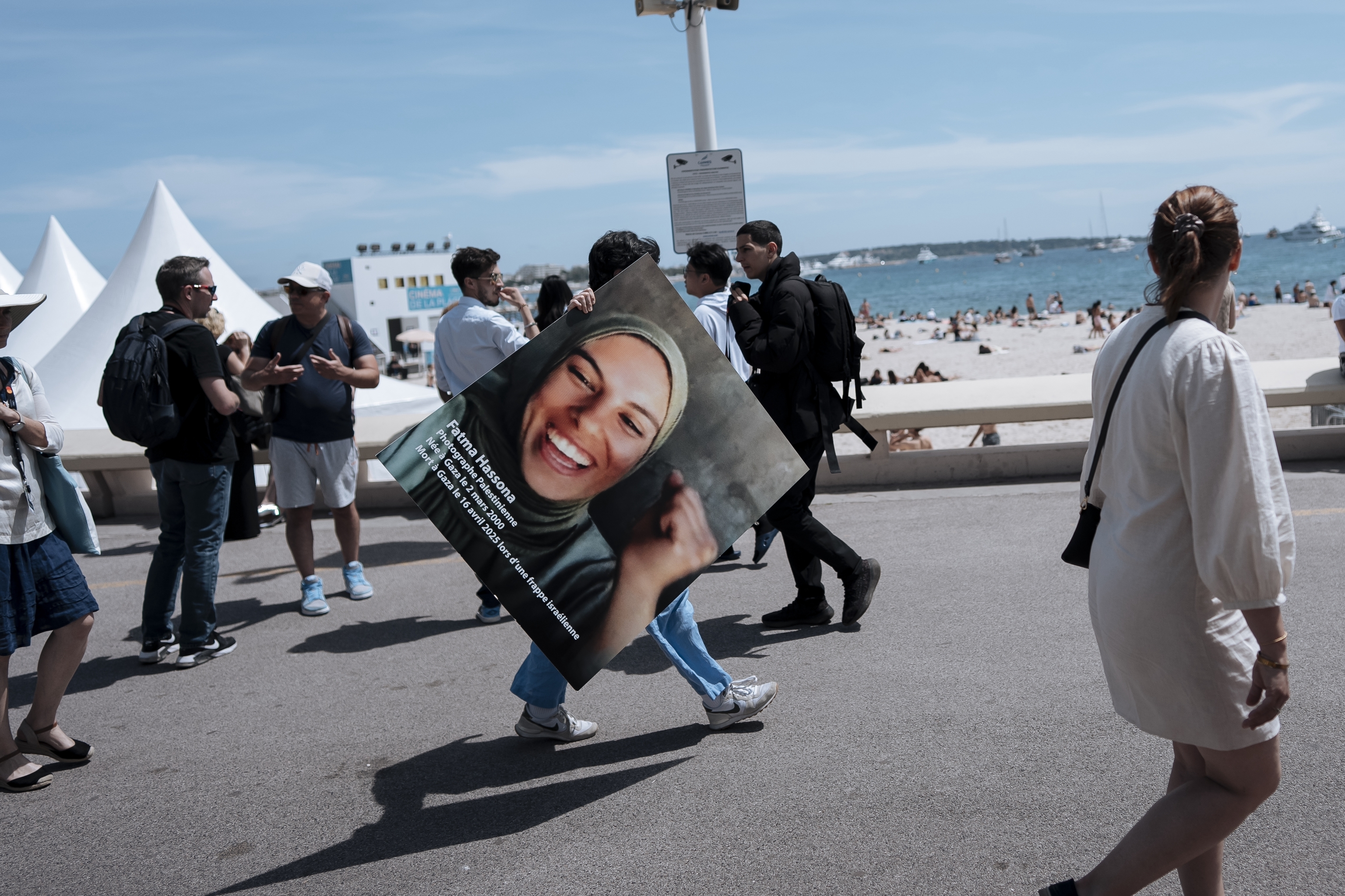Fatma Hassona has unintentionally become the only possible protagonist of the current Cannes Film Festival. We have only seen Fatma Hassona's face. Always (or almost always) with a different hijab, Fatma Hassona speaks from Gaza. She does so in a smiling and clear English. She tells her life, that of her younger brother, her parents, her never-ending family, she tells her desire to travel to Rome and shows her photographs.
Fatma Hassona is a photographer, and the images she reveals of her neighborhood in Gaza are portraits of a distant desolation, yet so familiar to us. The failure that surrounds her and that she photographs is undoubtedly our failure.
We met Fatma Hassona on the Thursday when the film in which she is the protagonist was screened in the Acid section of the Cannes Film Festival. But if we follow the chronology presented in the documentary, the first time we truly saw her was on May 1, 2024.
That was the day when Sepideh Farsi, the director, and she, Fatma Hassona, met via Zoom. And the last time was on April 15 of this year. In this conversation, the director told Fatma Hassona that the film they had been working on together for a whole year had been selected for Cannes. And Fatma Hassona was happy. And she made plans to go to the French city.
One day later, on April 16, Fatma Hassona was murdered alongside six members of her family by the Israeli army. Fatma Hassona is the only woman from the Cannes Film Festival.
Put Your Soul on Your Hand and Walk is the title of the film. The phrase is uttered by Fatma Hassona at one point to describe not only her mood, but also her way of life, always condemned to, despite everything, look forward and move on. With nothing more than, indeed, the soul, the soul in the palm of the hand.
The film proposed by Put Your Soul on Your Hand and Walk, in truth, we do not see it. It is all an uninterrupted succession of conversations, around 20, via Zoom. Fatma Hassona talks with Farsi, but their conversation's main focus is not strictly the Gaza War. The genocide, more than a war, runs in the background. Or rather, the genocide occupies everything but from within, or from outside the frame, as one wishes. Fatma Hassona proudly talks about living where she lives. She confesses that she, unlike Farsi, who left Iran at 18, does not plan to leave. "I would like to travel all over the world, but I would always come back," she says.
She talks about her fears, her concerns, and her aspirations, which, despite everything, weigh on her the most. And meanwhile, snipers, phosphorus bombs, buildings destroyed by bombings, and the deafening sound of an airplane sneak into the conversation. "They are Apaches," she says. "And what do they want to achieve?" asks the director. "What do they want? Very simple, to kill us," she replies and cannot hide a laugh. Fatma Cassona laughs. And she does so constantly to encourage herself, to not let her smile be taken away.
"Do you want to hear a song?" she says, and then plays the music she composed on her laptop. But Fatma Hassona knows how to cry. And when she does, it seems like she invents crying. Because of its depth, its anguish, the certainty of a void that sweeps everything away. "This is my friend Mahasen," she shows her photo. "She was 31 when she died in Tal Al-Zaatar. She was a very talented artist." And she shows her embroideries with shapes of animals, of living animals.
At one point, Fatma Hassona recalls a line from the movie The Shawshank Redemption: "Hope is a dangerous thing." Farsi talks to her about Virginia Woolf's book A Room of One's Own when Fatma Hassona describes her home and says she likes to be alone. Fatma Hassona appears depressed. And she cries. And she recovers. And she laughs.
Fatma Hassona died, as mentioned, without being able to show her film. A portrait of her hangs in the press room, and filmmakers from all over the world, from Juliette Binoche to Pedro Almodóvar, Joaquin Phoenix, and Pedro Pascal, have signed a letter condemning the silence about the genocide in Gaza. Binoche, the Jury President, did so right after watching her film, Fatma Hassona's film. Fatma Hassona was 24 years old when she was murdered.
